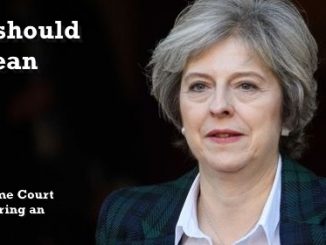
ER Editor: The question must be asked – was this part of the plan all along? Has it been yet another aspect of the scheme to destroy national economies and put them under the total economic control of the global bodies, as revealed recently by Belarusian president Aleksandr Lukashenko over the covid crisis? (see World Bank/IMF Exposed: COVID Aid Conditional On Imposing Extreme Lockdowns, Curfews) Or is this simply a few greedy law firms?
The Guardian article of August 15, 2020 is referenced below, Global firms expected to sue UK for coronavirus losses. Of note:
Governments around the world – including the UK – face a wave of lawsuits from foreign companies who complain that their profits have been hit by the pandemic.
Webinars and presentations shared with clients reveal that leading global law firms anticipate governments around the world will soon face claims over their response to the Covid-19 crisis. The actions are being brought under investor state dispute settlement (ISDS) clauses which are embedded in trade and investment agreements and allow foreign investors and firms to sue other countries’ governments.
The claims are heard in highly secretive ad hoc tribunals before a panel of three judges. Often it is not apparent that a case is being brought until the panel sits.
…
More than 600 civil society groups in 90 countries have written an open letter sounding the alarm. Signatories include Oxfam, Friends of the Earth, the International Trade Union Confederation (ITUC), SumOfUs and Global Justice Now. They warn at a “time when government resources are stretched to the limit in responding to the crisis, public money should not be diverted from saving lives, jobs and livelihoods into paying ISDS awards or legal fees to fight a claim”.
…
Blaylock added: “Why would a corporation sue? It seems so unreasonable, yet when you read the material from the law firms, to them it’s completely normal and they are expecting this to happen. They recognise there are incredibly valid public health needs, but they also understand that these courts are designed only to look at the interests of investors.”
It’s just business. While we count lawyers among some of our kindest personal friends, this article does beg the joke, What do you call 300 lawyers at the bottom of the ocean?
A good start.
We also recommend this piece from May 2020 by Corporate Europe Observatory, titled Cashing in on the pandemic: how lawyers are preparing to sue states over COVID-19 response measures.
The article below is a translation of a piece from online French journal Marianne.
********
Multinationals plan to sue states for Covid-19 related losses
MATHIAS TEPOT
Business law firms are pushing for multinationals to attack states for losing revenue during lockdown. It must be said that by signing free trade agreements and by committing themselves not to disrupt the proper functioning of the free market, the states are giving the stick to be beaten.
***
Fatcats! Multinational companies are thinking about holding governments accountable for taking action against the coronavirus that would have harmed their business. The last straw. Indeed, many have been heavily supported in recent months by the public authorities with cuts, or even cancellation of charges and taxes to cope with the pandemic, not to mention massive plans to support certain sectors … Weary, it would be all the fault of the States. All over the world, they will therefore be taking legal action, hoping to recover billions.
“The number of these lawsuits could be unprecedented and could impose considerable financial burdens on governments already burdened by devastating health and economic crises,” warned more than 600 NGOs from 90 countries on June 23. “Measures taken to restrict the activities of companies to limit the spread of the virus, to mobilize private hospitals, to force companies to produce certain emergency medical goods, to allow households to postpone or cancel payments of rents or housing loans, to prevent foreign investors from buying up companies, to guarantee access to drinking water or medicines, etc. could be affected” by these complaints, the NGOs feared.
CRIME-FIGHTING LAW FIRMS
An article in the Guardian of August 15 corroborates their statement. The newspaper reports that British law firms such as Reed Smith, Ropes & Gray and Alston & Bird are multiplying video-conferences to incite their international investor clients to attack states that have taken restrictive measures causing them economic harm. “Given the global scale of losses linked to the coronavirus, multinationals will be tempted to attack states,” says Romain Dupeyré, an arbitration lawyer associated with the law firm DWF.
How are they going to do this in practice? By relying on the free trade treaties signed between States, the vast majority of which contain clauses for settling disputes with international investors, the so-called ISDS. These allow foreign investors to sue before supranational arbitration tribunals of states that would be too interventionist and that would go against the sacrosanct rules of the free market. The ISDS had already caused controversy five years ago during the negotiations for a trade agreement between the European Union and the United States, finally buried by Donald Trump.
EMERGENCY MEASURES NOT CONCERNED
One downside (ER: or upside …), however: “If states find themselves forced to intervene in the event of a sudden calamity – as was the case in stemming the spread of the pandemic – the treaties concede that they cannot bear the responsibility and economic damage of their actions,” explains Romain Dupeyré. The emergency measures taken to fight the coronavirus should therefore not result in heavy penalties. “All this is turmoil,” says law professor, lawyer and international arbitrator Thomas Clay, “fuelled by certain law firms who see the large fees that could be generated by such actions”. Indeed, he also reminds us, “it is important to know that when measures to protect public health or the environment are taken by States, it is very rare that those who want to challenge them on the grounds that their investments would be threatened, succeed”. Thomas Clay recalls the Philip Morris precedent, which attacked Australia and Uruguay for introducing the neutral cigarette pack. The American giant was ultimately rejected by international arbitration tribunals, as the neutral pack was recognized as a public health issue.
It is in fact more the measures of restrictions going “beyond what is necessary” that could cost the States, estimates Romain Dupeyré. In particular those extended beyond the confinement period alone. In this case, “international comparisons are going to be used a lot” since some sectors of the economy may have been kept at a standstill in some countries and not in others. However, France should not be the most affected country in this future slump. “I don’t have the impression that the measures taken by the French state have been disproportionate to the economic interests of companies,” thinks Romain Dupeyré. “We wish a lot of courage to those who will want to attack the French state for taking lockdown measures,” warns Thomas Clay.
SULPHUROUS REPUTATION
However, for other, less economically powerful countries, the task will be more difficult. Of particular concern is Peru, where the government has ordered the closure of highway tolls conceded to international companies – the act of paying cash may be a way to spread the pandemic. But also El Salvador and Bolivia, which have allowed their populations to delay payments for public services such as water and electricity provided by foreign companies. These countries do not have deep pockets and are at the mercy of attacks by multinationals that have lost big with these measures.
All the more so since supranational arbitration tribunals suffer from a sulphurous reputation: pro-business, because they are created to counter the national justices of states that would favour their own interests too much and above all very opaque. “This was a reality, but it is less so today thanks to the action of NGOs in particular, which make sensitive cases public”, tempers Romain Dupeyré. For his part, Thomas Clay claims the usefulness of these tribunals:
“They are necessary to ensure impartiality when the parties are of different nationalities, a fortiori when one of the two is a State. It is important that a State should be able to apply the public policies it considers relevant without being hindered by contentious considerations. But on the other hand, it is also important that the investor is not the victim of a unilateral measure of the State that would deprive him of his investment. For example, when Argentina suddenly devalued its currency in the early 2000s, large French companies operating in Argentina were saved because their investments were protected by specific treaties, which provided for recourse to arbitration in the event of disagreement. Arbitration is often the condition for investment”.
Moreover, it can also be argued that it is the States themselves that have got themselves into a big mess: by dint of deifying international attractiveness, they are bending over backwards to attract foreign capital. At the risk of losing part of their sovereignty by signing free trade treaties in which they undertake to intervene only in cases of extreme necessity, under penalty of paying fines equal to the damage caused to the multinationals. Worse still, for those who are in a delicate situation with their public finances, legislating in certain areas of the economy may become too risky.
************
Original article

••••
The Liberty Beacon Project is now expanding at a near exponential rate, and for this we are grateful and excited! But we must also be practical. For 7 years we have not asked for any donations, and have built this project with our own funds as we grew. We are now experiencing ever increasing growing pains due to the large number of websites and projects we represent. So we have just installed donation buttons on our websites and ask that you consider this when you visit them. Nothing is too small. We thank you for all your support and your considerations … (TLB)
••••
Comment Policy: As a privately owned web site, we reserve the right to remove comments that contain spam, advertising, vulgarity, threats of violence, racism, or personal/abusive attacks on other users. This also applies to trolling, the use of more than one alias, or just intentional mischief. Enforcement of this policy is at the discretion of this websites administrators. Repeat offenders may be blocked or permanently banned without prior warning.
••••
Disclaimer: TLB websites contain copyrighted material the use of which has not always been specifically authorized by the copyright owner. We are making such material available to our readers under the provisions of “fair use” in an effort to advance a better understanding of political, health, economic and social issues. The material on this site is distributed without profit to those who have expressed a prior interest in receiving it for research and educational purposes. If you wish to use copyrighted material for purposes other than “fair use” you must request permission from the copyright owner.
••••
Disclaimer: The information and opinions shared are for informational purposes only including, but not limited to, text, graphics, images and other material are not intended as medical advice or instruction. Nothing mentioned is intended to be a substitute for professional medical advice, diagnosis or treatment.




